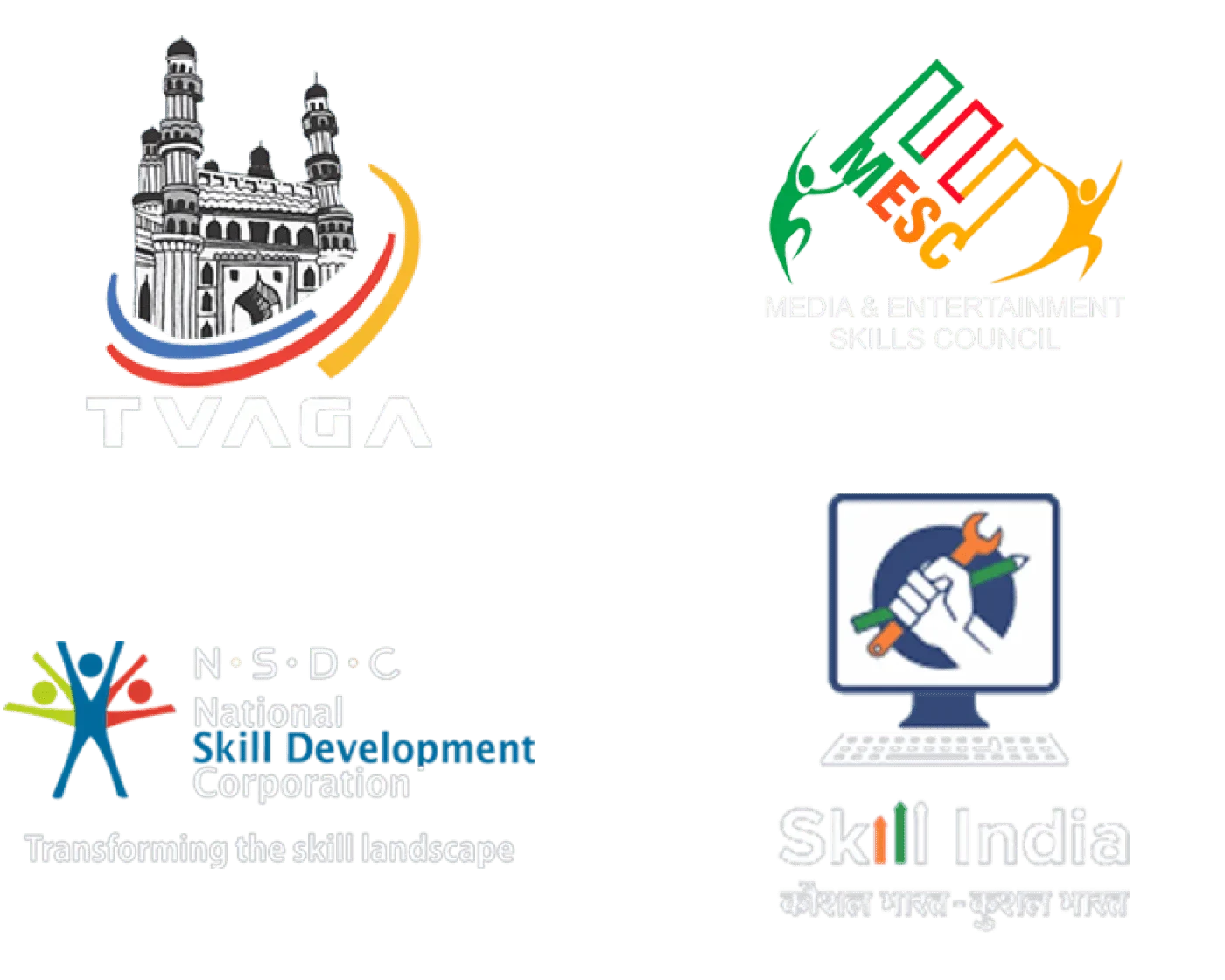Craft Compelling Narratives: Become a Filmmaking Pro
At AVGCI, we understand that storytelling is at the heart of filmmaking. Our program empowers you to master the art of crafting compelling narratives that resonate with audiences and elevate your projects to new heights. Whether you’re interested in directing, screenwriting, or producing, our comprehensive curriculum equips you with the essential skills to succeed in the competitive film industry.
SOFTWARES USED




What is Film Making?
Filmmaking is the creative process of producing motion pictures, from concept to final cut. It involves various stages including scriptwriting, directing, cinematography, editing, and post-production. Filmmakers work to bring stories to life, blending technical skills with artistic vision to create impactful visual narratives for film, television, and digital media.
What courses are we offering in Filmmaking?
We offer a range of Filmmaking courses focused on Cinematography, Direction, and Photography to equip aspiring filmmakers with essential skills. Together, these courses provide a comprehensive foundation for a successful career in filmmaking, helping students bring their creative vision to life on screen.
The filmmaking industry offers a wide range of exciting career opportunities, particularly in direction, photography, and cinematography.
What courses are we offering in Filmmaking?
We offer a range of Filmmaking courses focused on Cinematography, Direction, and Photography to equip aspiring filmmakers with essential skills. Together, these courses provide a comprehensive foundation for a successful career in filmmaking, helping students bring their creative vision to life on screen.
The filmmaking industry offers a wide range of exciting career opportunities, particularly in direction, photography, and cinematography.
Cinematography
Master visual storytelling through camera techniques, shot composition, and lighting. Learn how to create stunning visuals that enhance the narrative and mood of films and digital media.
Career Opportunities
Cinematographers, also known as directors of photography (DoP), play a crucial role in capturing the visual essence of a film. They collaborate with the director to establish the film’s visual style and are responsible for making artistic decisions regarding camera angles, lighting, and shot composition. To succeed in this role, cinematographers must have a keen eye for detail and a solid understanding of camera equipment and techniques. Many begin their careers as camera assistants or in other entry-level positions before advancing to more senior roles.
Job Roles in Cinematography
Director of Photography
Camera Operator
Camera Assistant
Gaffer
Grip
Direction
Learn the art of directing, working with actors, and translating scripts into visual stories. Master scene blocking, collaboration with crew, and leading a production from concept to final cut.
As a film director, you oversee the entire creative process of a film, managing everything from script development to post-production. Directors work closely with actors and crew members to bring their vision to life, requiring strong leadership and communication skills. Many directors start their careers in junior roles, such as assistant directors or runners, where they gain valuable experience and build industry connections.
Job Roles in Direction
Film Director
Assistant Director (AD)
Script Supervisor
Photography
Develop essential photography skills, including composition, lighting, and camera settings. Learn how to capture visually compelling images that elevate storytelling for both film and digital platforms.
In filmmaking, photography encompasses various roles, including still photographers who capture behind-the-scenes images or promotional shots for films. These professionals often work closely with marketing teams to create compelling visuals that attract audiences. Additionally, photography skills are essential for directors and cinematographers alike, as they must understand how to frame shots effectively to tell a story visually.
Job Roles in Photography
Still Photographer
Commercial Photographer
Editorial Photographer
Event Photographer
FAQ
In our film making courses at AVGCI Hyderabad, we delve into essential subjects crucial for aspiring filmmakers. These encompass screenwriting, direction, cinematography, sound design, editing, and post-production. Our curriculum is meticulously crafted to offer a holistic grasp of the entire filmmaking journey, spanning from pre-production to distribution.
At AVGCI Hyderabad, we take pride in our comprehensive and industry-aligned curriculum, placing us shoulder to shoulder with the finest film institutes in India. Our courses prioritize hands-on training and practical exposure, empowering students with the requisite skills to thrive in the dynamic film domain.
Our film making courses at AVGCI Hyderabad are meticulously designed to equip students for thriving careers in the film industry. Graduates can pursue diverse roles such as directors, cinematographers, editors, sound designers, and more. Many of our alumni have ventured on to collaborate with renowned industry players, carving out successful paths for themselves.
In our filmmaking department at AVGCI Hyderabad, students benefit from the mentorship of seasoned and highly qualified faculty members driven by a passion for teaching and knowledge dissemination. Our faculty boasts extensive industry experience, having contributed to a spectrum of projects including feature films, documentaries, and short films.
AVGCI Hyderabad offers filmmaking students access to cutting-edge facilities and technologies crucial for honing their craft. From a fully equipped sound studio to editing suites and a plethora of cameras and equipment, we ensure students have the tools they need. Additionally, students have access to industry-standard software like Adobe Premiere Pro, Final Cut Pro, and Avid.
Our film making course at AVGCI Hyderabad spans 12 months, designed to furnish students with a comprehensive understanding of the filmmaking process. The fee structure is competitive and accessible, with flexible payment options tailored to accommodate students from diverse backgrounds.

